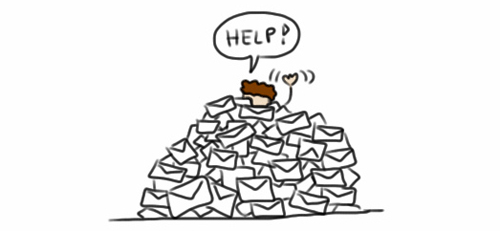
We’re buried in email! According to recent statistics, in 2020 alone, the average person received more than 120 daily emails at the office out of more than 300 billion daily emails sent and received globally.
Sure, spam filters can help us avoid the worst. (Thank you, Mimecast, for saving me from countless killer-SEO proposals, weight-loss supplements, and a few dubious cash investments with people who otherwise seem really nice.) Still, that’s a LOT of communication and not all of it is effective, necessary, or useful. So, what’s a busy executive do to remain productive at work, at home and to be a thoughtful person in this world? Well, you might just learn and implement strategies from a few new books.
Leadership expert Erica Dhawan takes theses challenges head-on in Digital Body Language: How To Build Trust & Connection, No Matter The Distance, an insightful book that definitely will make you think twice before hitting the irksome “Reply To All” on most messages. Non-verbal communication is critical in conversations, and our posture, hand gestures and facial expressions can convey as much meaning as the words we use (trust me, I’m Italian). With email and text, all of that is lost (even with emojis), and we can spend countless hours sorting out the emotional uncertainties of short texts or delayed email responses. Dhawan’s tips on how best to convey value, trust and meaning to colleagues and friends and across generations are smart, timely and important. Indeed, writing clearly “is the new empathy,” and let’s remember that a videoconference or phone call easily outweighs the most carefully crafted email or text.
Next, although you may be the center of a business universe or transaction, you need NOT be copied on every email, every time, all the time. That’s not helpful, and it certainly isn’t collaborating. So emphasizes Babson professor Rob Cross in his incisive new book Beyond Collaboration Overload, which includes in-depth examples, practical tools and direct coaching on new routines and digital communications for these post-pandemic times. You’ll identify with or at least know protagonist Scott, the overworked, overcommitted, and overwrought executive who is “in on” everything, but eventually must find a way out so he can drive performance and avoid professional and personal burnout. Among other things, Cross urges execs to step back from the typical technology-enabled, “always on” approach and create a “persistent dialogue on what is worth doing.”
Sound advice indeed.
For all of the emphasis on communicating effectively from our homes, desks and phones, we can’t let digital isolation displace community, purpose and things worth doing. We still need the wonder and meaning that comes from travel and in-person connections, once that feels normal and safer for all. That has me thinking about Republic of Detours, journalist Scott Borchert’s engaging new book on the Federal Writer’s Project, founded in 1935 during the New Deal to employ jobless writers as they created travel guides and stories for each state and region. Inspired by a collective love for storytelling, it was a messy, far-flung project that included future luminaries Zora Neale Hurston, Richard Wright, Studs Terkel and others in a raucous conversation about the American experiment and the crazy, diverse and thoughtful people and places in it.
Dialogue matters and by engaging each other genuinely, we advance the work of our lives and enrich our communities. We need more of this, especially now, and a lot less “Reply to All.” [Emoji intentionally omitted.]
Authors & Innovators is an occasional column by Larry Gennari, a transactional lawyer, law professor, and chief curator of Authors & Innovators, an annual business book and ideas festival. Gennari also teaches Project Entrepreneur, a business fundamentals bootcamp for returning citizens, at BC Law School.




